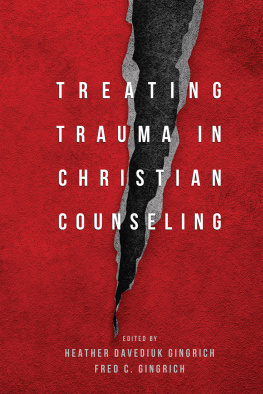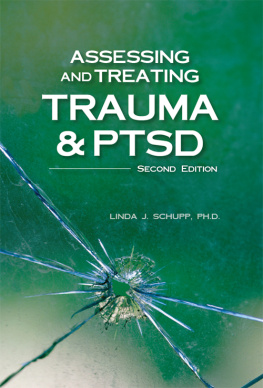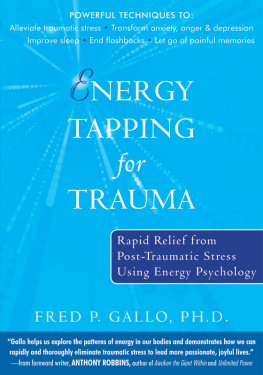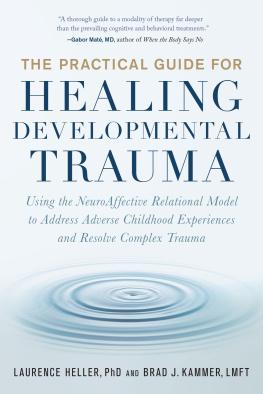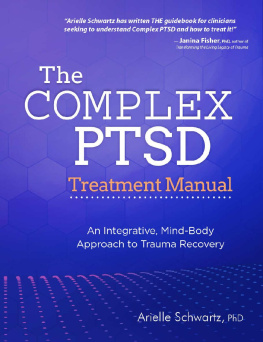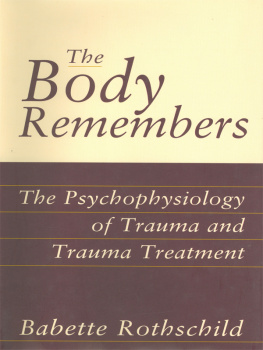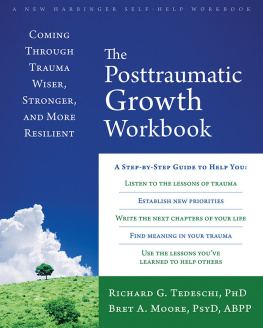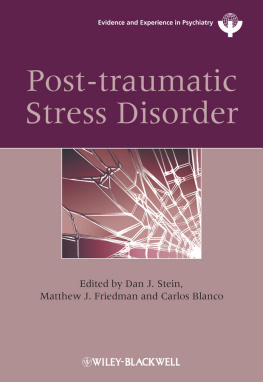Sommaire
Pagination de l'dition papier
Guide
TREATING
TRAUMA IN
CHRISTIAN
COUNSELING
EDITED BY
HEATHER DAVEDIUK GINGRICH
FRED C. GINGRICH
InterVarsity Press
P.O. Box 1400, Downers Grove, IL 60515-1426
ivpress.com
2017 by Heather J. Gingrich and Frederick C. Gingrich
All rights reserved. No part of this book may be reproduced in any form without written permission from InterVarsity Press.
InterVarsity Pressis the book-publishing division of InterVarsity Christian Fellowship/USA, a movement of students and faculty active on campus at hundreds of universities, colleges, and schools of nursing in the United States of America, and a member movement of the International Fellowship of Evangelical Students. For information about local and regional activities, visit intervarsity.org.
All Scripture quotations, unless otherwise indicated, are taken from The Holy Bible, New International Version, NIV. Copyright 1973, 1978, 1984, 2011 by Biblica, Inc.Used by permission of Zondervan. All rights reserved worldwide. www.zondervan.com The NIV and New International Version are trademarks registered in the United States Patent and Trademark Office by Biblica, Inc.
While any stories in this book are true, some names and identifying information may have been changed to protect the privacy of individuals.
Selected excerpts in chapter 14 are from Aten, J. D., OGrady, K. A., Milstein, G., Boan, D., Smigelsky, M., Schruba, A., & Weaver, I. (2014). Providing spiritual and emotional care in response to disaster. In D. F. Walker, C. A. Courtois, & J. D. Aten (Eds.), Spiritually oriented psychotherapy for trauma (189-210). Washington, DC: American Psychological Association. Used with permission.
Cover design: Cindy Kiple
Interior design: Daniel van Loon
Images: cracked paper background: ekychan/iStockphoto
ISBN 978-0-8308-8912-9 (digital)
ISBN 978-0-8308-2861-6 (print)
This digital document has been produced by Nord Compo.
To Rico, Lynette, and Janet
INTRODUCTION
HEATHER DAVEDIUK GINGRICH
AND FRED C. GINGRICH
What drew you to this book? Perhaps your interest in trauma emerges from personal experience, and either you or people you care about deeply have suffered as a result of exposure to traumatic events. Or it may stem from genuine compassionate concern for those who suffer, even without such intimate knowledge of the topic. For others, the exploration of this aspect of human existence may be more academic, in the sense that trauma has become a major area of study in the disciplines of psychology, sociology, and related fields.
Whichever of the above categories best fits you, studying trauma is likely to have some degree of personal impact. The horror of entering into the worlds of those who are trauma survivors, even if only on paper, can often produce a resistance to thinking and learning about trauma, perhaps to the extent of denying its prevalence or severity. Alternately, it can lead to a desire to understand the complexities of why trauma happens, how people survive, and what is involved in recovery. Either way, you may find this book a difficult read as page after page and chapter after chapter describe the ways in which trauma survivors have been affected by the horrendous things they have experienced. So we recommend that you pace yourself as you read so that you can sit with the material and monitor your emotional reactions to it as you go along. Practicing good self-care (see for suggestions) is also a wise idea.
How Big an Issue Is Trauma?
It is bigunfortunately, too big. In some significant ways trauma provides the context of human experience. Following are a few research-based statistics on the ubiquity of traumatic experiences. Other authors in this volume have added prevalence rates with respect to their specific areas of focus.
The US Department of Justice (n.d.) reports the following:
9.3% of cases of maltreatment of children in 2012 were classified as sexual abuse (62,939 cases of child sexual abuse); however, approximately only 30% of sexual assault cases are reported to authorities.
Approximately one in seven (13%) youth Internet users received unwanted sexual solicitations.
About 20 million out of 112 million women (18%) in the United States have been raped during their lifetime.
Research conducted by the Centers for Disease Control (CDC) estimates that approximately one in six boys and one in four girls are sexually abused before the age of 18.
Approximately one in five female high school students report being physically and/or sexually abused by a dating partner.
Estimated Risk for Developing PTSD
Rape: 49%
Severe beating or physical assault: 31.9%
Other sexual assault: 23.7%
Serious accident or injury (for example, car or train accident): 16.8%
Shooting or stabbing: 15.4%
Sudden, unexpected death of family member or friend: 14.3%
Childs life-threatening illness: 10.4%
Witness to killing or serious injury: 7.3%
Natural disaster: 3.8%
(Sidran Institute, n.d.)
The National Center for PTSD (2016) reports that going through trauma is not rare. About 6 of every 10 men (or 60%) and 5 of every 10 women (or 50%) experience at least one trauma in their lives. Women are more likely to experience sexual assault and child sexual abuse. Men are more likely to experience accidents, physical assault, combat, disaster, or to witness death or injury. Furthermore, about 7%8% of the population (about 10% of women and 4% of men) will develop posttraumatic stress disorder (PTSD) at some point in their lives. The rate of sexual assault within the military has been a national concern, with 23% of women reporting sexual assault while serving in the military.
The National Trauma Institute (2014) reports similar trauma statistics in a different way:
Trauma is the number-one cause of death in the United States for people 146 years old.
Trauma is the number-three cause of death in the United States overall.
Each year, trauma accounts for 41 million emergency room visits and 2.3 million hospital admissions.
Trauma injury accounts for 30% of all life years lost in the United States.
The economic burden of trauma is more than $671 billion annually.
Each year, more than 192,000 people lose their lives to trauma.
The United Nations Office for Disaster Risk Reduction (n.d.) reports the following economic and human impact of disasters worldwide (20042014):
Most of these statistics focus on the US context. If the United States is one of the safer countries in the world in which to live, then rates are likely higher in most other countries (see Rhoades & Sar, 2005, for examples). In addition, the associations between trauma prevalence rates and challenging social conditions are high: lack of education, poverty, war, community violence, intrafamilial violence, natural and human-caused disasters, human rights violations, torture, and so on all contribute to the risk of trauma. A Christian mental health response is necessary.
Why a Book Specifically on Christian Approaches to Treating Trauma?
The field of traumatology has exploded in the past decade. The concept and language of trauma have entered the mainstream of not only the mental health fields but also the broader culture. As Christians, we believe in the power and relevance of the Bible to our current cultural context and our personal lives. Scripture and the resources of our faith, therefore, are directly relevant to the human experience of traumatic events. While this book is not primarily a theological or biblical treatise, we believe that Christian faith has direct application to understanding and responding to trauma through the overarching redemptive story of the Bible (creation, fall, redemption) and the long-affirmed power of the Jesus story (birth, life, death, and resurrection).

